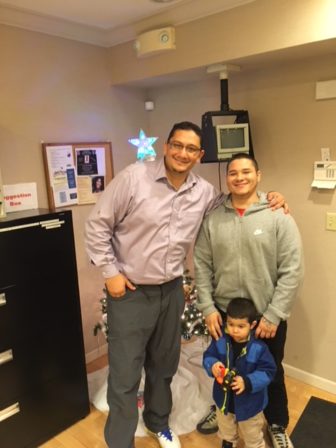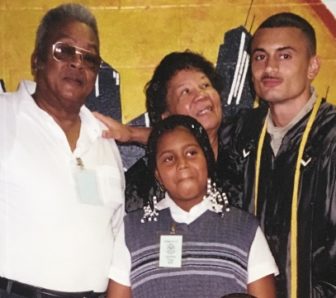Da’ee McKnight with his daughter and grandparents at his college graduation while he was still incarcerated.
Da’ee McKnight got out of prison just days before his daughter graduated from high school. He was particularly excited to attend her graduation because it was the first time his daughter would see him as a free man.
McKnight was convicted of homicide shortly before his daughter was born and spent the next 17.5 years in prison — her entire childhood.
Although he was incarcerated, McKnight got to know his daughter through a program called extended family visits. This program allows inmates with good conduct to meet with family or friends for an extended period of time in a secure location away from the rest of the incarcerated population.
“My grandmother or grandfather would bring my daughter up and I’d get 24 hours in the trailer with her,” McKnight said. “It taught me how important being a father was, but also how essential it is to be a positive and productive example to your child.”
Now he’s trying to share that knowledge with other fathers.
Today, McKnight works for a Bridgeport-based, non-profit called Family Re-Entry that helps former prisoners re-assimilate into their community and, most importantly, their families. McKnight specifically works with men, like himself, who have been estranged from their families and now must figure out how to meet the needs of their children.
“When kids have a dad involved in their life – development, relationships, emotional and academic outcomes all benefit.”
Linda Dixon, DCF administrator:
The work of Family Re-Entry is funded, in part, by a grant awarded last year by the state Department of Children and Families to engage fathers like McKnight, both while they are in prison and after they are released, so that they can learn to be involved parents.
“Basically, what we do is we get a referral from DCF and it will be a referral for a father who is difficult to get in the ballgame of DCF’s process,” McKnight said. “Once we receive the referral, our job is to get the initial contract and motivate the dad to get involved with the services we offer, which help him become a better dad.”
Heart
The push behind the effort came from the realization that DCF’s parenting programs nearly all targeted mothers.
“It’s cultural,” said Gary Kleeblatt, DCF’s spokesman. “The caretaking role is traditionally associated with moms. We found that a special effort needs to be made to reinforce the importance of dads with staff, providers and community members.”
The program is broken into two segments. The first is a $120,000 grant awarded to Family Re-Entry — led by McKnight — that is working with incarcerated fathers to get them interested in being a part of their children’s lives and into a program within the community to which they will be returning.
The second part is a $900,000 grant split between six organizations, including Family Re-Entry, located in each region of the state. The money from this one-year contract allows the non-profits to work with men who have already been released from prison. The other five grantees are Clifford Bears, Madonna Place, the Village for Families and Children, Wellmore and Families, and New Opportunities.
“When kids have a dad involved in their life – development, relationships, emotional and academic outcomes all benefit,” said Linda Dixon, an administrator at DCF. “It is an important factor in positive child welfare outcomes.”
Breaking the Cycle of Incarceration
A father and his children who have benefited from Family Re-Entry.
McKnight’s daughter became his motivation while he was behind bars.
Although he was still in prison, he worked to end the cycle of incarceration in his family that had persisted for generations. He got involved in religious programs, voluntary self-help programs, pursed a college degree program from which he graduated as valedictorian, and became a Muslim.
“I think it is important to understand that people are products of those things that influence them,” McKnight said. “Children don’t have a lot of choice as to what influences them, people make mistakes. The beautiful thing about being a human being is we are the most adaptable animal on the planet, and with time and repetition, we can produce new behaviors.”
A milestone for McKnight was the day he graduated in prison, earning an Associate’s degree:
“I was the valedictorian and my daughter told me that day she was going to college when she grew up,” McKnight said. “She did go to college and complete her Batchelor’s degree in public relations. She is now into film production.”
Now, through his work with Family Re-Entry, McKnight is in a position to help other fathers like himself who are caught in a cycle of crime and incarceration and can’t seem to figure a way out.
“He helped me with everything,” said Donte Crawford, a formerly incarcerated Bridgeport resident who connected with Family Re-Entry as soon as he entered the prison system. “He helped me see my kids, get my license and live in a house when I got out. It actually allowed me to save my money, settle down and see the bigger picture of becoming a young adult.”
Crawford said he benefited beyond what he can express from Family Re-Entry:
“Without Family Re-Entry I probably would still be in prison,” Crawford said. “I got out early because of my progress. I was doing everything I had to do: going to program, taking every class, good behavior, they take that into account when they talk to parole.”
The program targets fathers in the 18 to 24-year-old range, said Angela Medina, the Director of Family Re-Entry.
If the father becomes involved in their child’s life, “it could be a really positive thing for both of their lives,” Medina said.
Round 2: Struggling to engage dads
According to recent studies, healthy father involvement can promote child development, decrease time spent in foster care, and reduce the likelihood of maltreatment allegations.
A big part of the Family Re-Entry program is teaching dads the ways they can be involved with their children — even if they do not live with them and they are not in a relationship with the child’s other parent.
“We are trying to figure out what the dad sees as the barriers to communicating with DCF and being involved with their kids,” said Joseph Guios, a DCF program coordinator and social worker. “When dads feel less connected, they will be less motivated. We need to find a way to get them connected, whether that is going with the dads to appointments, helping them build a resume so they can have a job and help support their child, really grass roots types of efforts to meet dads where they are.”
There are many reasons a father may be estranged from his child, DCF officials said. Sometimes, like in the case of McKnight, the child is born while the dad is already incarcerated. Other times, the mother does not know who the father is or want to tell him about the baby if she does know.
“DCF struggles to engage dads and a lot of it has to do with social worker beliefs. We need to change beliefs of staff and find a way to give fathers a fathers-focused intervention.”
Joseph Guios, DCF program coordinator:
“I’ve heard stories that there are fathers who didn’t know they had children,” Kleeblatt said. “An acquaintance of the dad called the father who was out of state and said that this woman who he had a relationship with just gave birth. Now the baby lives with that dad.”
DCF’s Fatherhood Engagement Leadership Team (FELT) partnered with community providers in the Hartford-Manchester area to test-pilot the services beginning in March 2017.
“DCF struggles to engage dads and a lot of it has to do with social worker beliefs,” Guios said. “We need to change beliefs of staff and find a way to give fathers a fathers-focused intervention.”
When a dad is not involved, a child is missing out on half of their family, not only their father, Guios added, and family is a child’s most important resource.
According to Guios, a common problem for DCF — and a major reason behind turning to non-profit help — is that fathers do not trust the agency.
“Dads have a lot of frustration and worries with DCF. They don’t think DCF has their best interests at heart,” Guios said. “When the service providers would go out, they didn’t feel that initial anxiety.”
Additionally, the largely-female social worker staff may have implicit bias against the dads, he said, or even fear them.
“Most of our social workers are female, and there is a level of intimidation that must exist,” Guios said. “There are plenty of people out there that can be very intimidating, especially when you are walking in and threatening their child, the most important thing in their life.”
It is the hope of both DCF and Family Re-Entry that employing former inmates like McKnight to work with fathers will help get these dads back in the lives of their children.
“Family Re-Entry made a major step in innovation when they realized that if they wanted re-entry to work, they needed ex-offenders to work for them,” McKnight said. “People need an example and a role model.”
And for many, McKnight has been that role model:
“Growing up I didn’t have a father,” Crawford said. “Da’ee is a real good role model. Seeing his face, that is really showing genuine care, was so helpful.”



